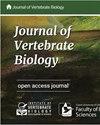Recruitment and satisfaction of commercial livestock farmers participating in a livestock guarding dog programme
IF 1.5
4区 生物学
Q2 ZOOLOGY
引用次数: 1
Abstract
Abstract. Livestock guarding dogs (LGDs) are used to prevent livestock depredation and used in a number of conservation programmes as a human-wildlife coexistence tool. Although the livestock protection outcomes of LGD use are well studied, relatively little is known about the motivations or perceptions of the farmers involved. This mixed-methods study investigated recruitment and satisfaction in 108 South African commercial livestock farmers participating in an LGD programme. A semi-structured interview schedule and existing dataset were used to collect both qualitative data (analysed according to the principles of thematic analysis) and quantitative data (summarised using descriptive statistics). Word-of-mouth was the predominant source of programme awareness (n = 69), with direct recruitment by programme managers reducing proportionally over time, indicating programme self-perpetuation. Satisfaction was ‘high’ for most farmers (n = 90) and trust between farmers and programme managers was important in recruitment, motivation and satisfaction, along with perceived reductions in livestock losses. Concern for wildlife only motivated 21 farmers. LGD behavioural problems were reported by 49 farmers, but 95 would still use an LGD again. These novel findings demonstrate the importance of inter-stakeholder dialogue for obtaining crucial knowledge for LGD program development. Where non-conservation-related motivators predominate for key stakeholders, greater emphasis on these other factors during programme recruitment, advocacy and/or evaluation may improve stakeholder engagement and retention.参与牲畜护卫犬计划的商业畜牧养殖户的招聘和满意度
摘要家畜护卫犬(LGDs)被用来防止牲畜被掠夺,并作为人类与野生动物共存的工具被用于许多保护计划中。尽管对使用LGD的牲畜保护结果进行了很好的研究,但对相关农民的动机或看法知之甚少。这项混合方法研究调查了参加LGD计划的108名南非商业畜牧农民的招募和满意度。使用半结构化访谈时间表和现有数据集收集定性数据(根据主题分析原则进行分析)和定量数据(使用描述性统计进行汇总)。口头宣传是方案认识的主要来源(n = 69),方案管理人员的直接征聘随着时间的推移而成比例地减少,这表明方案是自我延续的。大多数农民的满意度“很高”(n = 90),农民和项目管理者之间的信任对招聘、激励和满意度以及牲畜损失的减少都很重要。对野生动物的关心只激励了21位农民。49名农民报告了LGD行为问题,但95名农民仍然会再次使用LGD。这些新颖的发现证明了利益相关者之间的对话对于获得LGD项目开发的关键知识的重要性。在与保护无关的动机占主要利益攸关方的情况下,在方案征聘、宣传和/或评价期间更加强调这些其他因素可能会改善利益攸关方的参与和保留。
本文章由计算机程序翻译,如有差异,请以英文原文为准。
求助全文
约1分钟内获得全文
求助全文

 求助内容:
求助内容: 应助结果提醒方式:
应助结果提醒方式:


